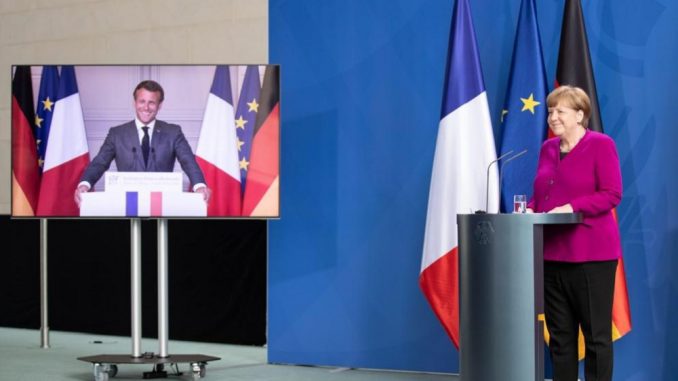
Whatever the EU decides, it will remain an imperialist bloc at the service of capitalist profits.
By Rubén Tzanoff, SOL – Spanish State
The European Union´s crisis deepened with the pandemic. The Union is currently in the midst of a lengthy discussion about the steps to be taken in the immediate future. After expressing marked differences they agreed on April 23 to create a recovery fund, postponing the decision of: how much to commit, how to finance it and how it will be accessed.
They had announced that they would present a concrete plan on May 6, but that did not happen. Meanwhile, doubts over the veracity of European Commission (EC) president Úrsula Von del Leyen´s promice regarding aid of “at least” one trillion Euros increased. Furthermore, the German Constitutional Court questioned the Bundesbank’s participation in the debt purchase program of the European Central Bank (ECB), throwing a cloak of uncertainty over Europe´s common future.
You may be interested in > The EU and Capitalism Have No Fix
However, there was a “turn” on May 19: in a common appearance, Chancellor Angela Merkel and President Emmanuel Macron announced an agreement to commit € 500 billion to the recovery fund. In this relaunching of the deteriorating political relations between Germany and France, they also said that the contribution will be carried out in the form of budget transfers, prioritizing the regions most affected by the pandemic, those most indebted and with the lowest levels of development and income. As a requirement to access the funds, the obligation to implement “sound economic policies and an ambitious reform program” was outlined. It is impossible to ignore that, in the past, similar formulations have resulted in health cuts, reactionary labor reforms and loss of social rights.
If carried out, it will be the first time that the EU approves financing member states’ expenses with common EU debt, anchored in the community budget and backed by issuing bonds. The movement is in tune with the EC’s aspirations to “find a balance between loans and non-repayable investments,” though it has warned that its final proposal will not be a “copy, paste” of the Franco-German plan. Countries like Italy and Spain took the news with pleasure. Not so the Netherlands, Austria, Denmark and Sweden, which are preparing a counterproposal to present to the EC before the official plan comes to light. Dutch Prime Minister Mark Rutte clearly stated his objective: “If you make a request for help, you must make far-reaching reforms.”
We must not place false expectations in the Franco-German proposals, the frugal countries, or the EC, everyone agrees on implementing austerity conditions. What they debate is the degree of the austerity and how it should be applied. The EC announced that it will not ask for austerity measures until the end of the year, since it will evaluate in November whether to reapply the “austerity” rules that were relaxed to allow states to increase spending in the face of the pandemic. And, if it does not find conditions to adjust at that time, it will do so in the spring of next year, when it will issue new recommendations. With little margin to continue “buying time,” the EC reprogrammed the details for May 27. Be that as it may, the Troika will be able to change the black suit it wore in the Greek crisis, but it will not alter its essence: it will try to make the working people pay for the crisis with more austerity.
With the political and economic mistakes, the Brexit missile and the lack of a common response to the pandemic, the image of the EU was destroyed and its unity is questioned more than ever. For this reason, they will try to mitigate the crisis and avoid division by conforming all its members, even if they have different positions. A new setback would leave the “Europeanists” who command it weakened against the right-wing “Euroskeptics” who haunt the governments of each country.
When the funds and their application are determined, surely, a part will go to social aid, because the living conditions of the great majority have worsened. Also because of something else: Europe’s powerful do not want to see a repetition and multiplication of what they witnessed, with panic, in France with the “yellow vests” and similar phenomena in other countries that led to rebellions, strikes and struggles against the consequences of capitalist exploitation. But most of the resources will go to saving the European capitalist economy in crisis and the bosses’ profits. In anticipation, the capitalists are the ones who place the most expectations in the package, since their main recipients are known; they have the approval of the EU to recapitalize the structure of affected large companies with public money.
You may be interested in > What´s the Use of the UE?
In all variations, beyond promises, maneuvers, and makeovers, the EU is an imperialist bloc that serves a handful of privileged people, and capitalism is an exploitative and unjust system. At this stage of capitalism, no aid is proposed that would imply a real recovery of production, because financial speculation dominates. So, in one way or another, money will return to the circuit that causes cyclical crises. There should be no expectation of anything similar to a “Marshall Plan,” or a sustained recovery. The only possibility to recover employment, wages and achieve decent living conditions will come by the hand of mobilization, struggle and the construction of a political alternative that fights for a different model: socialism with democracy, as we propose from the International Socialist League.








